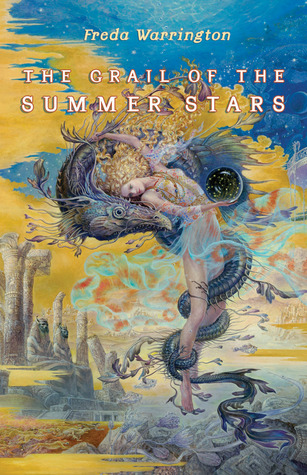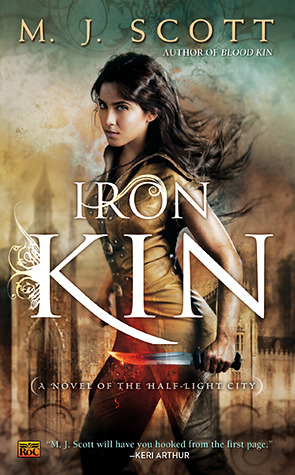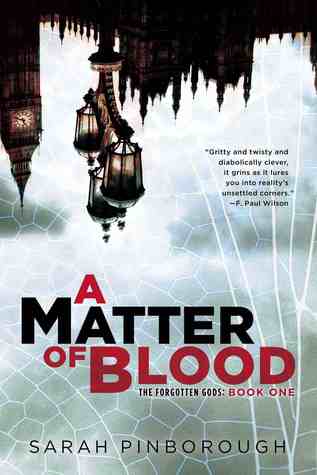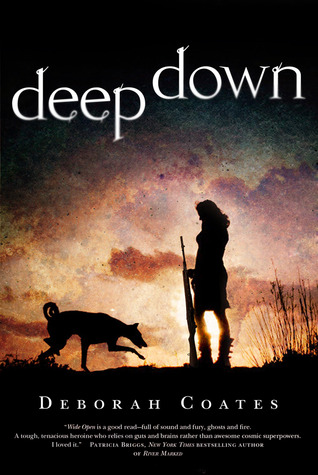Sarah Chorn's Blog, page 103
May 1, 2013
Special Needs in Strange Worlds Kickoff
I wasn’t planning on doing this until Monday, but life has a way of exploding in my face. My doctor called today and said if he didn’t operate on my back ASAP, I’m running the risk of paralysis, which would be permanent. I go in for surgery first thing in the morning. I learned that about an hour and a half ago, and now I’m rushing through the month of May, scheduling posts for this event.
Three things you should know.
First, I had a lot of people offer to participate in this event, and then a lot of them fell through for one reason or another. Normally I’d harp on people to remind them to participate, but my health took a dive and I just haven’t had time. I’m working with what I have.
Secondly, due to the minimal (but very strong) new posts this year, I’ve decided to fill in some of my time with some of my favorite posts from last year. I’m also expecting some posts to trickle in throughout the month, so I will add them when they come. As of right now, expect 2013′s version of Special Needs in Strange Worlds to be a wonderful mix of old and new.
Three: Since I have to approve all the comments on my webpage, please expect a few days between your comment to come in, and me approving it. I’ll be recovering, and while my husband will have the password and run of my website, I don’t actually expect him to be as devoted to comment approval as I am. You’re not forgotten, and your comments haven’t disappeared into the great Internet abyss. I’ll just be recovering, and slow.
As always, I truly appreciate everyone for participating in this event. I was going to write something profound to kick it off, but in the spirit of mixing old and new, I realized I wrote something profound last year, so I’m going to post it again. You can find the original post on this website. This post talks about my inspiration behind this event (my big brother) and the reasons why Special Needs in Strange Worlds is so important to me.
Stay tuned this month. I hope to sprinkle in reviews here and there so I don’t fall too incredibly behind in that regard, but most of the posts will be Special Needs in Strange Worlds themed. If you have anything you’d like to say in a guest post, please don’t hesitate to contact me. Just like last year, I’ll be accepting posts all month long so please don’t be shy. I want to include everyone who has something to say.
—–
There is a line in Game of Thrones by George R. R. Martin in which Tyrion Lannister says, “I have a tender spot in my heart for cripples, bastards, and broken things.” It is probably one of my favorite quotes from any book I’ve ever read, because it resonates so strongly with me. And it’s notable that of all the actors in the HBO series, Peter Dinklage, who of course plays Tyrion Lannister, is the most talked about and celebrated.
There’s something there, something about disabilities that pulls at the reader (or viewer, as the case may be), and helps them relate to a character and even make them or the plot more interesting. My husband has never read the books, so I was surprised when he heard that line and turned to me and said, “Wow, that’s powerful.” It’s interesting how one line in a show or a book can resonate strongly with so many people.
What is even more interesting is how disabilities in literature are almost never talked about. In fact, when I was organizing my Special Needs in Strange Worlds event, a large chunk of people backed out saying they were uncomfortable discussing this issue. It’s a sensitive topic, and perhaps that’s why, but disabilities in literature should be noted and celebrated. Disabilities add depth and a very human perspective to any plot, but they so often overlooked in literary discussions.
My oldest brother is disabled. He was born without part of his brain, the corpus collosum, to be exact. For a long time my brother was labeled as high functioning autistic. The symptoms fit, but there is more to my brother’s disability than meets the eye. He has a hard time distinguishing between what’s real and what’s not real. He also has seizures and some physical limitations. My brother has always felt like the odd man out, and in many ways he is. He lives in his own little world. In all honesty, I can’t imagine how isolated he feels. He has as hard of a time connecting with the real world as the real world does with him. This makes it hard for him to work, to have friends, to connect with family. He really struggles, and as his sister, that’s hard to watch.
My brother is the person who got me into fantasy. I’ve often wondered if the reason he likes the genre so much is because it’s a genre where his mind can run wild. It doesn’t have the rules and restrictions of most genres. I can see where that would be appealing to someone with his condition.
A few years ago he had a fever of 109. He was in the hospital for days. Doctors thought he was going to die, but somehow he pulled out of it. However, this incident basically fried his short-term memory. My brother can’t read books anymore. He can’t follow complex plots or keep the characters straight. He was a true bibliophile. He lived in his books, and now he can’t. However, his long-term memory is fine so we often discuss books he has read sometime in the past.
It was during these discussions that my brother started talking extensively about how isolated he often felt while reading fantasy due to how ignored disability often is in literature. He told me numerous times (and left plenty of comments during my event) that disability brings reality and depth to books. It makes them more real, because disabilities are so humbling, so human and so prevalent in our own world. When I put the idea of Special Needs in Strange Worlds past my brother, his exact words were, “Finally, someone is going to talk about how people like me can be important, too.”
My brother is the reason I did Special Needs in Strange Worlds. He walked me through the annals of speculative fiction through a disabled person’s point of view, and showed me how incredibly isolating it must be to struggle so much in reality to connect with other people, and then have to struggle for that same connection in literature as well. My brother can’t read and enjoy books anymore, but he’s not the only disabled person on the planet. Disabilities are incredibly common, ranging from depression to far more serious conditions. Disabilities are all around us, and I wanted Special Needs in Strange Worlds to highlight the importance of disability in literature.
What amazed me was how hungry the Internet seemed to be to read a series of posts featuring disabilities in literature. I didn’t expect more than two weeks worth of posts, but instead I had enough to fill an entire month. In fact, I had so many people offering to write posts for the event, I had to turn several people down. Furthermore, this event received more visits than my blog has ever received in one month in its two years of life. Special Needs in Strange Worlds clocked in at 50,000 unique views. Not only was my brother hungry to hear about how disabled individuals can profoundly influence literature, but a massive amount of other people were, as well.
April 30, 2013
Necessary Evil – Ian Tregillis
 About the Book
About the Book
12 May 1940. Westminster, London, England: the early days of World War II.
Again.
Raybould Marsh, one of “our” Britain’s best spies, has travelled to another Earth in a desperate attempt to save at least one timeline from the Cthulhu-like monsters who have been observing our species from space and have already destroyed Marsh’s timeline. In order to accomplish this, he must remove all traces of the supermen that were created by the Nazi war machine and caused the specters from outer space to notice our planet in the first place.
His biggest challenge is the mad seer Greta, one of the most powerful of the Nazi creations, who has sent a version of herself to this timeline to thwart Marsh. Why would she stand in his way? Because she has seen that in all the timelines she dies and she is determined to stop that from happening, even if it means destroying most of humanity in the process. And Marsh is the only man who can stop her.
Necessary Evil is the stunning conclusion to Ian Tregillis’s Milkweed series.
Published on April 30, 2013
Published by Tor
Author’s webpage
This book was sent for my review by the publisher.
——
I’m mad as hell. Let me tell you why.
The “tri” in “triptych” means three. Necessary Evil is the third book in Tregillis’ series, which is the Milkweed Triptych. That means it’s the last book in a series that is one of my all time favorite reads in the history of ever and that ticks me off.
The problem isn’t that the ending is bad. In fact, the ending of the series is pretty perfect. The part that ticks me off so much is that the series is over and I’m just not ready for that. How dare Ian Tregillis have an insane talent for writing and how dare he write a series I can’t help but be absolutely obsessed with. The sheer audacity of the guy for writing something this amazing and then letting it end!
Necessary Evil is the magnum opus of this series. It truly is a perfect, gut wrenching, and absolutely absorbing ending. The surprising part of it (for me) is the fact that it deals with time travel (which usually turns me off instantly) and still managed to be interesting, engrossing and believable. These are qualities I usually don’t find in books that deal with time travel. That being said, we’re talking about Grandmaster Tregillis here, so I can’t really expect anything he writes to be the usual. No, he takes the usual, twists it, redefines it, and throws it at the reader and lets them deal his new creation.
Necessary Evil deals with all of the characters we were introduced to throughout the series. What’s different is that there are two Raybould Marshes, one of whom is the younger version we were introduced to in the first book and the other Marsh is older, battle scared and time worn. This version travels back in time to try and stop an absolute catastrophe from happening. Mixed into this is Greta, who is one of my favorite, most creepy, literary characters any author has ever created. Greta is just as creepy as she was in all the other books, but this is magnified a bit because all her weirdness, her random sentences and odd behavior in other books are suddenly understandable. The reader finally gets to see the motive behind her madness, and in one part you can’t help but be in absolute awe of an author capable of inserting that kind of genius so subtly into his series. On the other hand, you can’t help but be in awe of Greta because, well, come on! That kind of manipulation is damn impressive.
This is, perhaps, where I really need to give Tregillis some serious accolades. Throughout the past two books, random things have happened, Greta has said some weird things at random times that made no sense to anyone, not the readers, nor the characters. She’s done odd things, manipulated events, and before now it’s all seemed like it was for no apparent reason. Greta was just insane and that’s what insane people do. It isn’t until Necessary Evil that the reader will really realize just how incredibly detailed and meticulously planned the plot of the entire series really is. I call Greta a genius, but she’s only a genius because Tregillis is a master manipulator of his readers. Necessary Evil is one of those books where everything suddenly comes together, and all the small details you might have puzzled over in previous books click in place. It’s a book full of those wonderful “ah ha” moments that I absolutely love. Necessary Evil is a book where you can’t help but admire the mental capacity of an author who has created such an intricate plot, and somehow managed to make every little tiny detail in three incredible books make perfect sense.
The plot is fast moving and just as dark as it’s been throughout the series. That being said, it’s not all doom and gloom. Tregillis weaves in quite a bit of hope and light throughout the book. Sometimes the silver lining is subtle and the reader might have to look for it a bit, but it’s always there. There’s a lot of love, and the actions of Marsh, who pretty much gives up everything to save his family, is nothing short of humbling. Perhaps that aspect is slightly overshadowed by some of the action, but it deserves to be noticed. Marsh is a man who is so in love, so dedicated to his family he gives up everything for the fragile hope that he can make things right. This really balances out the darkness nicely, and gives this superhuman tale a bit of sympathetic humanity that gives it some fantastic depth and light.
The plot of Necessary Evil is just as fast paced and intricate as all the other books. In fact, with the time jump going on, I’d say it’s even more intricate than the other books. It’s detailed and riveting. Tregillis ends his series with one hell of a bang, but somehow that fits. It’s dark and atmospheric. His characters are raw and real, but it’s the details that really make Necessary Evil stand out. It’s those details that show Tregillis for the literary grandmaster that he truly is. Necessary Evil is the end of a series that rocked my world. It’s a series I’ve already read twice, and I have every intention of reading it over and over again. Necessary Evil ties everything together nicely and the complex, fast moving, incredibly dark plot is the icing on the cake. This is an edge-of-your-seat read that had me saying (very unprofessionally), “holy shit…” in absolute reverence over and over again.
And I’m mad as hell, because the series is over.
5/5 stars
April 26, 2013
An Aside | Inactivity
I haven’t been incredibly active recently. On Twitter, I’ve mentioned health problems. Well, last October I had surgery on my spine. Around December it started hurting again. It’s deteriorated to the point where I called my doctor last week in tears because I hurt so bad I couldn’t walk. I went back to the doctor, got some x-rays done. Went back again and got an MRI done, and went back again and learned that I’ve severely herniated three discs, which are squashing two (2) nerve roots this time, which is causing me unbelievable agony. I’m almost to the point where I need a cane to walk again.
Add to that the fact that I just started a new job.
And I need to have a three level disc fusion ASAP.
Stress. That’s really how I can sum this up. Absolute, supreme stress. I’ll probably lose the job I just got because of this and I hurt so bad it’s really all I can focus on right now. I’m waiting for the doctor to schedule my surgery, but he’s been really fun to get in touch with these past few days (sarcasm font). So I’m waiting.
In the meantime, I’ve been doing what I do every time my health implodes. I’m taking tons and tons of pictures. Why? Because it reminds me that even though I’m in an intense amount of pain and basically nonfunctioning, the world is still a beautiful place.
I hope to have things under control enough to be able to blog again soon. Until then, I’ll probably only be able to think straight enough to write a critical review at the times when my pain isn’t shooting through the roof. Those times are incredibly rare these days. Just hang in there with me.
Here’s some of my recent work that’s been getting me through this.










April 22, 2013
Grail of the Summer Stars – Freda Warrington
 About the Book
About the Book
The climactic concluding novel in the spellbinding magical contemporary fantasy Aetherial Tales trilogy
A painting, depicting haunting scenes of a ruined palace and a scarlet-haired goddess in front of a fiery city, arrives unheralded in an art gallery with a cryptic note saying, “The world needs to see this.” The painting begins to change the lives of the woman who is the gallery’s curator and that of an ancient man of the fey Aetherial folk who has mysteriously risen from the depths of the ocean. Neither human nor fairy knows how they are connected, but when the painting is stolen, both are compelled to discover the meaning behind the painting and the key it holds to their future.
In Grail of the Summer Stars, a haunting, powerful tale of two worlds and those caught between, Freda Warrington weaves an exciting story of suspense, adventure and danger that fulfills the promise of the Aetherial Tales as only she can.
384 pages (Hardcover)
Published on April 23, 2013
Published by Tor
Author’s webpage
You can purchase a copy of this book by clicking on the following links: Grail of the Summer Stars (Aetherial Tales) , Grail of the Summer Stars (Aetherial Tales) – Kindle
, Grail of the Summer Stars (Aetherial Tales) – Kindle
—–
Before I even need to review this book there is something I should say. If Freda Warrington didn’t write, it would be a crime against humanity. This woman was born to write and tell stories and she does it incredibly well. I fell in love with her work with the first book in the Aetherial Tales series, Elfland. That love has just grown with each installment in the series.
Now with that being said, you can pretty much guess that this review will be more of a gush than an actual critical piece.
One of the wonderful things about the Aetherial Tales series is that each book is roughly stand alone. While some of the characters will be revisited, they are usually secondary, or even more background than that. Elfland set up the world, but I don’t think it would be too hard for readers to pick up the second or third book in the series and appreciate it, though some of the world building nuances might be confusing in the later two books.
Grail of the Summer Stars is the last book in this series, which brings me no endless amount of sadness, as I absolutely love Warrington’s world. As with the other books in this series, Grail of the Summer Stars is a sort of hybrid fantasy/urban fantasy tale. While most of the book takes place in our world, there are occasions when the reader will visit the Spiral and see the otherworld that seems to parallel ours. There is also a bit of romance, and while it’s fairly predictable, Warrington has learned how to infuse a book with romance without it being the least bit nauseating or over-the-top.
Grail of the Summer Stars is a bit darker than the other two books in the series seem to be. The protagonist, Stevie, runs a museum and has a knack for art and history. She’s a rather fascinating, educated and mature character. This is coupled nicely by the fact that she really has no past and no memory of anything before she was fourteen. On the flip side is Mist, a fae who is obsessed with finding his brother and sister, all of whom have been haunting each other through the eons. There is a sort of twisted Game of Thrones/Romeo and Juliet thing going on in the family which adds some darkness to the book as well. Mist and his single-minded determination to find his brother before his brother finds him can cause him to be realistically blind to things happening around him, and also slightly frustrating.
While each of Warrington’s books are darker, more mature and much more “mellow” than most of the other “in your face” urban fantasy out there, this truly works in her favor. Her characters aren’t cute, funny and attention grabbing. They are memorable. They work their way under your skin until you feel like you aren’t just reading about them, but you are them. By the time the book is over, you will feel as though you’ve lost a fascinating world and an amazing friend. All of this is true with all of Warrington’s Aetherial Tales books, but she truly perfected it with Grail of the Summer Stars. While some of the plot and romance might be predictable, Warrington has perfected atmosphere and her characters fairly jump off the pages.
Grail of the Summer Stars is full of adventure, misdirection, and plenty of very detailed and twisted history. There’s romance, friendship, betrayal, growth, revelations and much more. Basically, it’s anything anyone could possibly want in a book. I can honestly say the only other urban fantasy book I’ve enjoyed this much for many of the same reasons is Of Blood and Honey by Stina Leicht. These two authors know how to write an incredible story full of emotional drama, depth and amazing world building.
Freda Warrington doesn’t just write urban fantasy. She’s mastered it.
5/5 stars
April 16, 2013
Iron Kin – M.J. Scott
 About the Book
About the Book
Imagine a city divided. Fae and human mages on one side, vampire Blood Lords and shape-shifting Beast Kind on the other. Between these supernatural forces stands a peace treaty that threatens to shatter at the slightest provocation….
I was raised to do the right thing. But to my family that means staying safe behind the walls of human society. To be a respectable metalmage and never put myself at risk. But the treaty is faltering. And if it fails, nothing is safe. To help save the city and everyone I care about, I will use whatever means I can to ensure the negotiations to renew the treaty are successful—even if that means forging an alliance with a man who is the very opposite of the right thing….
Fen is trouble. Wild. He would rather bind himself in iron and drink himself into oblivion than learn to master the visions that come to him. Those visions might just hold the key to peace, and it seems that my power might hold the key to his control—if I can keep it around him….
336 pages (paperback)
Published by ROC
Published on April 2, 2013
Author’s webpage
This book was sent for me to review by the publisher.
—–
Iron Kin is the third book in a series I’ve never read before. While this would normally put me off, but each book in this series is more or less stand-alone, so it really wasn’t that hard to jump in on book three and pick up the world, characters and stories that had been built in previous installments. In truth, this series follows a pretty typical paranormal romance flow meaning each book follows a different couple as they meet, fall in love, and do whatever it is that they need to do.
Scott does a fairly good job at keeping readers up to date on what happened with secondary characters that were covered in previous books in the series. While some details at the start might confuse readers, it’s not that hard to catch up on what was covered and the basic world building. In that sense, Iron Kin is an incredibly easy book to start reading.
The world itself is fairly interesting, being a sort of secondary steampunk world which is divided between those who live in the daylight (humans, mages, etc) and those who prefer the night (beastkin, vampires, etc). While the steampunk elements are fairly low key, they are there, and they add a nice spice and diversity to an otherwise cookie-cutter plot.
The problem with Iron Kin is that it’s basically just like every other boy-meets-girl story out there that I’ve read with the unique world and politics being its one redeeming factor. Fen is a mongrel with a dark past and uncontrollable visions. Saskia is a high born woman who is way out of his league out to prove to the world how amazingly tough she is. They try to stay apart, but amidst all the political tensions that are falling upon them, they realize their desire for each other is overpowering.
Really, what else do I need to say?
Scott’s writing is rather superb, despite the paint-by-numbers storyline and characterization. That is, perhaps, the one thing that pulled me through Iron Kin. Under Scott’s deft ministrations, despite the rather flat story and the characters that can’t stand on their own, the world is actually rather interesting. Iron Kin is just like so many other books I’ve read, but there are some points where it is different, and those points are important. Scott isn’t afraid of politics, and while not all of the politics make complete sense, they are there and they are engrossing.
Despite my harping on this book, I read it in a day and I didn’t breeze through it that quickly because it was terrible. I breezed through it because Scott has some quality writing skills that she puts to good use with a story that is some delicious brain candy. While the romance is the standard thing, Scott keeps it from being too nauseatingly overpowering to the rest of the plot. Instead, it runs a nice parallel to the tensions happening in other aspects of the book. Honestly, brain candy has a place, too.
Fans of romance might find Saskia and Fen’s relationship lacks a little intensity and passion that they look for, and the ending has a distinctly sweet rather than romantic feel to it. There are some moments when the sexual tension and sex itself goes a little over-the-top, which are the times that will satisfy the romance reader’s itch. However, Scott seems more focused on the plot of Iron Kin rather than the romantic elements of it, and the balance the author struck between the two was a great bonus for someone who isn’t incredibly into romance.
Perhaps the points where I would have appreciated more elaboration was on the magic system, which was hinted at and explored a little bit, but never really had much depth. The steampunk elements of the world are also hinted at by various carriages that people use to ride around and things like that. If Scott had elaborated more on the steampunk aspects and perhaps detailed her magic system more, Iron Kin might serve to pull in more diverse readers.
Iron Kin really isn’t my typical cup of tea. I’m not that into romance, but I read it because it looked interesting. This isn’t your typical romance book. The politics, steampunk and interesting magic system attest to that. If Scott had more emphasis on those elements, Iron Kin, and the series itself, would probably appeal to a wider audience. As it is, Iron Kin is a fun, distracting fantasy novel that will appeal to romance readers, while probably not being the right flavor for many fantasy readers, like myself.
2/5 stars
April 11, 2013
Save my email!
I usually leave the deep thoughts and intelligent essays to other bloggers who are far better at it than I am. However, today I guess I will break that rule because, honestly, I’m getting a bit miffed so I’m going to share my rantiness to the world.
My website generally gets about 1,000 hits a day, which I don’t think is too impressive, but it’s a learning experience and things change over time. A lot of those 1,000 hits are probably authors, publishers, agents and other people who are curious about the genre. Each day I get roughly 10-20 letters from authors, publishers, PR gurus and whoever else telling me about (insert book here) and asking me to please read and review it.
I love it. I really do. That’s a huge reason I decided to start my website. I love being part of such a passionate, evolving and fast moving genre. It’s a huge thrill every time I check my email. I fondly look back on those first few days where I got excited if my page got 30 hits. Now I get about 1,000. Things have grown bigger and along with growing bigger, my email has become a pretty popular place.
The email I receive is all generally the same: So and so wants to know if I will read and review (insert book here). However, the delivery of this message varies widely. While most people are professional, and introduce me to themselves and then tell me about what they want me to read, and close the letter nicely, I’ve noticed an odd trend with people sending me incredibly weird letters. At first I brushed this off (I still usually do. It takes all kinds.), but I’m getting these letters more and more often and it’s making me write this.
I’m not sure people understand that my email is virtually my way to have a private meeting with the publisher, author, or agent. You aren’t just emailing me with a review request; you are emailing me to establish yourself as a promising professional in a very sprawling and quickly growing field. While some people may think its just email, for me it is your first impression. It is your chance to impress me with your professionalism and passion. While the venue might be different, I liken it to a business lunch.
The email I get tells me a lot. I can tell if the author or publisher is driven, determined and passionate. I can usually guess how promising the book is, and more. If the passion of those who contact me inflames me they generally get a “yes, I’d love to read and review (insert book here)” right away. To be honest with you, that is what most of my email is like.
But occasionally (which is becoming more frequent for some reason) something slips in that just rubs me the wrong way. When I was going through cancer treatment I got an email from an author about “national sex with an ugly person day.” I’m sure that was supposed to be hilarious, but it was unprofessional, crass and completely turned me off. A few weeks ago, I got a letter from someone offering to write my review of their book for me. Last year, someone offered me an iPod if I read their book. As I write this, my inbox is being spammed by the PR department of a publisher I won’t name.
I realize it takes all kinds, and with my email being my filter between the professionals and the not-so-professionals, I can (and do) expect to get a wide variety of email. I usually just laugh it off, but it has started happen more and more often and it’s making me wonder if people really don’t realize that writing an email is their chance at a first impression for me and other reviewers. In the case of publishers spamming me, it makes me wonder if they need to reassess how their PR department is running. There are more effective and impressive ways to contact critics.
I’m not doing these reviews for money. In fact, my website takes as much time to run as a full time job and I’ve never been paid a cent for any of it. I prefer it that way. This is my hobby and my passion and I don’t do it for pay or notoriety. I do it because I truly love this genre and I want to share my love with everyone else. I want the world to love SFF as much as I do.
Spending so much time trying to make Bookworm Blues better than it was yesterday means that even though I’m not getting paid, I consider it my business and my email is my office. The thing is, book review blogs really do make an impact. I can’t tell you how many books I’ve bought and read purely because another blogger I respect has recommended it. I also add Amazon links to all of my book reviews (unless I forget) and books I review actually do sell, so I know my reviews make an impact in that respect. The stats are there. Don’t think of reviewers as people who have too much time on their hands. Think of us as business partners of sorts. Like any partner, we need to be approached and used effectively.
I’m not writing this long, gripey diatribe to dissuade people from contacting me. I’m writing to remind you that my website, and the sites that other reviewers out there spend so much time and effort running, aren’t jokes. Our email isn’t a place to fill with crude jokes, or spam over and over again with newsletters. That isn’t impressive and it doesn’t incline me toward reading those books. Our reviews do matter and they do make an impact. We do this because we love it. While I will always expect to get letters that offer me gift cards, or random publishers spamming my inbox, I hope this long winded gripe fest makes people stop and realize that we critics aren’t a dumping ground for weirdness or unprofessional behavior. We might not get paid, but we are business men and women all the same, and your email to us is your first and most important impression.
Make it count.
April 10, 2013
Resurrection – Tim Marquitz
 About the Book
About the Book
Armageddon averted, the world returns to business as usual. Unfortunately for Frank “Triggaltheron” Trigg, business as usual sucks.
His night out interrupted by a horde of kidnapping zombies, what could possibly be worse? The resurrection of the Anti-Christ, that’s what. Caught in the middle of a supernatural pissing match between the Devil’s wife, a legion of undead, and an overachieving necromancer, Frank must survive long enough to stop Hell from being unleashed upon humanity; Again.
173 pages
Published on June 1, 2011
Published by Damnation Books
Author’s webpage
This book was provided for my review by the author.
—–
There are a few authors out there who don’t get the recognition they deserve. These literary giants infuse their well-written books with passion and take readers on some overwhelming, unforgettable adventures. They deserve to have their praises sung but rarely does that happen. It’s criminal that these authors are largely overlooked when they deserve the limelight just as much as some of the big name authors out there. Publishing is a dog-eat-dog world, and I always take advantage of the moments when I can shed some well-deserved light on those less known, but amazing authors like Tim Marquitz.
Resurrection is the second book in Martuitz’s Demon Squad series, following on the heels of Armageddon Bound. Frank finds himself in the center of another world crisis, which is something you learn to expect from the nephew of Lucifer. Marquitz wastes almost no time at all before throwing his protagonist in the middle of another incredible situation. In fact, Resurrection takes off like a gunshot. During the first few pages, the gun cocks and almost right away it fires and off everything goes. The plot is so quick moving; readers might have a hard time pulling themselves away from it.
Frank is a wonderful character to follow with a dark sense of humor that keeps things lively and rather hilarious despite all the rather serious situations he finds himself in. However, it’s not just Frank’s humor that makes him interesting. Marquitz does a great job at building up Frank past the character that was introduced in Armageddon Bound into someone who is even more believable and well rounded. The fact that Marquitz keeps his characters evolving is a huge plus in my opinion. So many authors establish their characters in the first book and fail to evolve them in subsequent additions.
Frank still works for DRAC (Demon Containment and Resistance), and Marquitz keeps the organization, Franks place in it, and his world evolving nicely. While the basic aspects of the world building are the same, Marquitz adds some nice new characters and people/things/whatever to Resurrection. These additions add some subtle expansion and nuances to Frank’s world that was really appreciated.
The action truly is nearly nonstop, and though Marquitz keeps the witty banter going throughout, some of the gore might be a little too much for some readers. That being said, Marquitz keeps his action engaging, which is saying something as I tend to enjoy gore, but find the details of said gore and action usually fairly boring. However, the plot is fairly breakneck and it never really lets up. That’s not a bad thing, but by the time I was finished with Resurrection I felt like I had just spent four hours at the gym doing some intense kickboxing. It’s incredibly rare that a book has the ability to mentally engage me and leave me feeling physically wiped out at the same time.
I might give the impression that Resurrection is a rather serious novel, but it’s not really. Marquitz is a hilarious author, and no matter how serious, gritty or intense the action got, he managed to keep me laughing. Resurrection itself has a rather surreal quality that is truly enjoyable. It’s part braincandy and part over-the-top noir that somehow works perfectly. Marquitz only seems to improve with each book released. Equal parts badass and hilariously irreverent, Marquitz always manages to scratch my literary itch.
Seriously, if you haven’t read this series yet, what are you waiting for?
5/5 stars
April 8, 2013
Sword of Fire and Sea – Erin Hoffman
 About the Book
About the Book
Three generations ago Captain Vidarian Rulorat’s great-grandfather gave up an imperial commission to commit social catastrophe by marrying a fire priestess. For love, he unwittingly doomed his family to generations of a rare genetic disease that follows families who cross elemental boundaries. Now Vidarian, the last surviving member of the Rulorat family, struggles to uphold his family legacy, and finds himself chained to a task as a result of the bride price his great-grandfather paid: the Breakwater Agreement, a seventy-year-old alliance between his family and the High Temple of Kara’zul, domain of the fire priestesses.
The priestess Endera has called upon Vidarian to fulfill his family’s obligation by transporting a young fire priestess named Ariadel to a water temple far to the south, through dangerous pirate-controlled territory. A journey perilous in the best of conditions is made more so by their pursuers: rogue telepathic magic-users called the Vkortha who will stop at nothing to recover Ariadel, who has witnessed their forbidden rites.
Together, Vidarian and Ariadel will navigate more than treacherous waters: Imperial intrigue, a world that has been slowly losing its magic for generations, secrets that the priestesshoods have kept for longer, the indifference of their elemental goddesses, gryphons—once thought mythical—now returning to the world, and their own labyrinthine family legacies. Vidarian finds himself at the intersection not only of the world’s most volatile elements, but of colliding universes, and the ancient and alien powers that lurk between them.
277 pages (paperback)
Published on June 4, 2011
Published by Pyr
—–
There are a few novels that I can’t figure out for one reason or another. Those novels tend to frustrate me. Do I like it or not? Sometimes I just can’t answer that question. Thankfully moments like that are rare but that doesn’t change how frustrating they are when they happen.
Sword of Fire and Sea starts out promising. The writing and descriptions are vivid, the prose is lyrical and flowing. Hoffman immediately sets up a vibrant secondary world, complete with unique magic and cultures which automatically put readers in the mind of epic fantasy. Hoffman’s style of writing might serve to enchant some readers. She truly does have a gift, and occasionally it’s wonderful to just sit back and enjoy her writing. However, there’s a honeymoon phase and once you are out of it, you might realize that there are problems that might not have been obvious at the start.
For example, while I enjoy lyrical, flowing and almost poetic prose, Hoffman occasionally goes over-the-top with her descriptions. They tend to dominate the plot so much it is distracting. While it is wonderful to be able to visualize characters, landscapes and the like, there’s a line that Hoffman crossed sporadically that gave the entire novel a slightly overcooked feel.
Another issue readers might face once they get out of the honeymoon phase is the sheer cardboard feel to the plot and characters. Sword of Fire and Sea is set up to be an epic fantasy in a secondary world. Much of the plot takes place on the go, which serves to introduce readers to numerous peoples and cultures and broaden their view of Hoffman’s world, as well. The problem is with the execution. There are plenty of epic fantasy travel based novels, like The Wheel of Time series, where much of what happens deals with movement from one location to another. Hoffman’s execution is off. This is helped by her over-the-top and sometimes clunky descriptions, but there are other issues as well. For a novel that deals so much with her broad world, it never feels fleshed out, vibrant or real. It feels like a pastel backdrop and I never was sure why I should care about it.
The cover of the novel reminds me a bit of a video game. There’s the woman wearing something that most women perched on a rocky outcrop would never wear, with the hunky guy standing behind her, and then the overpowering gryphon. There’s nothing really wrong with that, but it’s not realistic. It’s the sort of thing I see in my husband’s videogames where the hardcore women are just about naked while they fight (insert really bad thing here). It’s fun to watch, but that’s why he plays those games. They are fun, they aren’t really challenging or absorbing.
That’s how I think of Sword of Fire and Sea. There’s lots of pomp and circumstance, but when you really analyze the novel, the characters are very two dimensional, unbelievable, hard to sympathize with and rather corny with interpersonal relationships that tend to pop up with almost no buildup and had a tendency to make my eyes roll. There was so much potential for Hoffman to flesh out her world in the numerous adventures her characters face, but it never really gets past bare brushstrokes, despite her grandiose descriptions. I was left with an impression that this novel was very cardboard and cookie cutter.
I felt incredibly frustrated by this, because I’ve never really read a book before that showed so much promise with the prose, and just, for whatever reason, couldn’t deliver with world building or character development. I’m not sure what caused the great schism between development and execution, but it is there. The truly criminally unfortunate part of this is the fact that Hoffman put so much effort into Sword of Fire and Sea. There are the buds of brilliant ideas and visions here, they just needed a little more firm handling and more time to grow.
This is, perhaps, where my crisis comes in. On the surface, Sword of Fire and Sea is one hell of an epic fantasy novel with some powerful writing. However, once you get used to the writing and you really analyze the plot, it almost seems like Hoffman uses her writing to cover up the fact that there really isn’t much here. It’s agonizing to me, because I love seeing another female voice enter the epic fantasy fray. I also think Hoffman has the ability to write incredibly well. Even though I do pick on it for being a little over-the-top, given a firm editor, I think a lot of the slightly overcooked feel to her prose would have been gone. However, I have to balance that thought with the fact that everything I’m lauding is surface level, and under that there’s really nothing there.
In the end, I think Sword of Fire and Sea will have a rather divided audience. Readers will either love it for the style and art of it, or they will be a bit less enamored due to the fact that it’s a rather two-dimensional affair with a plot and characters to match. To sum it up, it is unbelievable, but beautiful.
I don’t have a clue where to put it.
2/5 stars
April 3, 2013
A Matter of Blood – Sarah Pinborough
 About the Book
About the Book
In a world steeped in darkness, a new breed of evil has fallen…
London’s ruined economy has pushed everyone to the breaking point, and even the police rely on bribes and deals with criminals to survive. Detective Inspector Cass Jones struggles to keep integrity in the police force, but now, two gory cases will test his mettle. A gang hit goes wrong, leaving two schoolboys dead, and a serial killer calling himself the Man of Flies leaves a message on his victims saying “nothing is sacred.”
Then Cass’ brother murders his own family before committing suicide. Cass doesn’t believe his gentle brother did it. Yet when evidence emerges suggesting someone killed all three of them, a prime suspect is found—Cass himself.
Common links emerge in all three cases, but while Cass is finding more questions than answers, the Man of Flies continues to kill…
352 pages (paperback)
Published on April 2, 2013
Published by Ace Trade
Author’s webpage
This book was provided for me to review by the publisher.
You can purchase a copy of this book by clicking on the following links: A Matter of Blood: The Forgotten Gods: Book One (The Forgotten Gods Trilogy) , A Matter of Blood: The Forgotten Gods: Book One (THE FORGOTTEN GODS TRILOGY) – Kindle
, A Matter of Blood: The Forgotten Gods: Book One (THE FORGOTTEN GODS TRILOGY) – Kindle
—–
When A Matter of Blood showed up at my door, my first reaction was an exaggerated eye roll and a muttered, “Wonderful, a vampire novel.” Then I read the back of it and I realized that this book has absolutely nothing to do with vampires (yay!). Instead, A Matter of Blood centers around a serial killer and the cop, Cass, who is trying to figure out who it is. While that may sound a bit like a standard thriller novel, it really isn’t. Pinborough wastes no time setting herself apart from the horror/thriller crowd.
On the surface, A Matter of Blood looks like a typical noir setup. There’s the somewhat downtrodden cop who is thrust in the middle of an intense situation that only he can find his way out of. However, it only takes about a page or two before the reader will realize that this really isn’t noir. The tone of the novel is a lot more serious, and the atmosphere is intense and shockingly dark. This is one of those books that seems to tread the line between horror and thriller perfect, never really falling into one category or the other. By doing this, has a wider appeal to people who might not favor fantasy as much as they enjoy non-fantasy thriller.
Cass is a rather refreshing character because he’s someone I could really relate to. He doesn’t work in black and whites, instead, his world is colored with shades of moral gray. He does the best he can with what he has, but he’s not above taking bribe money from his friend and crime boss. He works hard during the day, but when things get to be too much, he has his own vices he falls back on. In other words, he’s not some idealistic literary character who has fallen on hard times; he’s shockingly realistic and just as dark as the rest of the book.
All of the characters were unique in their own ways, though some of them felt a little more clumsily developed than others. While it’s not obvious who is setting up who and why until the end of the book, Pinborough makes it fairly obvious who the antagonists are by their somewhat over-the-top negative attitudes. That being said, the plot and writing style is so absorbing, that small detail is easily overlooked.
The plot moves forward at a steady clip. Pinborough has mastered the art of pacing. Each chapter is exactly as long as it needs to be, and they almost all end with leads to the next chapter. This is one of those books where saying, “I just need to read one more chapter” might end up keeping you up all night as there really aren’t any comfortable ending spots, and the tension ramps up nicely as the book progresses. Things get more complicated as Cass finds out more and with the leading endings to the chapters…. Just be prepared to lose sleep.
With a book this small, Pinborough covers a lot of ground. The economy is in shambles. London is far different than the London most of us know and love. While Pinborough does spend time building up the world and the history, most of her world building seems to be done through emotional tension and facts that are implied through Cass’s solving of the case(s) at hand. It is rather refreshing to read a novel this intense and detail oriented without having to spend chapters wading through detailed world history.
Perhaps the only true downfall with A Matter of Blood were some fairly typical plot elements that lacked a little creativity when coupled with Pinborough’s stunning writing style. For example, Cass is framed in a gruesome murder (which is said on the back of the book so I’m not blowing anything here). It adds a nice, important and personal dynamic to the plot, but this felt a little too paint-by-numbers for Pinborough. It’s something the reader can smell coming a mile away, and with a book this surprising and dark, being able to predict something that important in the plot was a let down. Furthermore, the introduction of gods and divinity and the various fantasy elements were fun, but they never really became as believable as the rest of the plot. Necessary to the story, yes, but they could have been less clumsily inserted.
That being said, A Matter of Blood blew me away. It’s a fast moving, gripping tale that is equal parts horror and thriller. The plot is tense and quick moving, if a bit clumsy at times. You should set aside some time to read this one, as it’s a novel that will keep you up far past your bedtime.
4/5 stars
April 2, 2013
Deep Down – Deborah Coates
 About the Book
About the Book
Death stalks the haunted, windswept prairie in this chilling sequel to Wide Open
Now that she’s solved her sister’s murder, Hallie Michaels has left the army and isn’t sure what to do next. Her relationship with deputy Boyd Davies is tentative, there’s still distance between her and her father, and she needs a job. The good news is, she hasn’t seen a ghost in weeks.
All that changes when she gets a call asking her to help an elderly neighbor who is being stalked by black dogs, creatures from the underworld that are harbingers of death. When a black dog appears, Hallie learns, a reaper is sure to follow. And if the dark visions she’s suddenly receiving are any indication, it looks like the reaper is now following her.
Meanwhile, strange events herald the arrival of ghosts from Boyd’s past, ghosts the young deputy isn’t ready to face. Refusing Hallie’s help, Boyd takes off to deal with the problem on his own, only to find that he’s facing something much larger and more frightening than he’d imagined.
Stalked by a reaper and plagued by dark visions, Hallie finds she must face her fears and travel into Death’s own realm to save those she most loves.
304 pages (hardcover)
Published on March 5, 2013
Published by Tor
Author’s webpage
This book was provided for my review by the publisher.
You can purchase a copy of this book by clicking on the following links: Deep Down , Deep Down – Kindle
, Deep Down – Kindle
—–
Deborah Coates attracted my attention with her breakthrough novel Wide Open. It is urban fantasy, but an entirely different animal than any other urban fantasy I’ve read. Coates set herself up as a master of atmosphere and I absolutely dug it. Then Deep Down, the second in the series, arrived at my doorstep and I started reading right away. It quickly became obvious that everything Coates showcased in Wide Open was perfected in Deep Down.
Coates has a very interesting writing style which I can only define as minimalist, and it’s incredibly effective. Her protagonist Hallie is a very self-contained individual, and that really permeates all aspects of Deep Down. Coates never over-explains or over-describes anything. In fact, she almost understates everything. While that does take a little time to get used to, it is also very effective with engaging the reader. Coates leaves a lot up to the imagination. It’s understood that Hallie’s town is small, she lives on a farm, and the landscape is flat. Coates never really goes into paragraph long descriptions detailing any of this. Instead, she infuses her book with incredible atmosphere, and it’s the atmosphere that seems to fill in the gaps that the author leaves. It’s actually a rather incredible and unique way to write, but it’s very effective.
Deep Down relies a bit on everything that Coates built up in Wide Open. The small town has already been established, as well as the magic system and Hallie’s unique abilities. While you could probably start with Deep Down and enjoy it on some levels, I think reading Wide Open first to get associated with Coates’ world and unique writing style would probably be wise.
This is probably where the biggest issue I had with the book lies. While I usually expect each book in a series to expand the world, characters, magic system and etc. a little more, Deep Down really doesn’t do that. The world has already been built, and it really has nothing shockingly new to offer the reader. While that might be fine for most readers, it was rather a disappointment to me. I’d have enjoyed to learn more of the nuances of Coates’ world, and they never really appeared. The plot was new, but the world lacked the evolution I’d have wanted to see.
That being said, I’m not exactly sure further evolution was necessary for the plot. While it would have been enjoyable, it might have been like adding a sprig of parsley to your dinner plate. It would have been a pretty adornment, but rather useless in the long run and I doubt it would have meshed well with Coates rather minimalist writing style. Furthermore, additional details probably would have messed up her ability to infuse the book with such an incredible atmosphere. The atmosphere is really where Deep Down thrives. Coates’ sparse writing style really makes the book feel as barren as the land on which Hallie lives. While that might sound like a bad thing, it’s actually not. It absolutely infuses the book with an eerie feel that is incredibly rare for me to find in literature. It allows the plot to really get under the readers skin, and makes the scary parts of the book truly frightening.
Hallie continues to be a unique character to follow. She has a sort of dark and dry sarcasm that could be easy for some readers to miss. Her unique abilities continue to evolve and her ability to take everything in stride says more about her character than anything else. That’s yet another aspect of Coates’ minimalistic writing that I enjoyed. She doesn’t tell the reader that Hallie is resilient. You just figure it out by how Hallie reacts to the situations she finds herself in. Hallie is rather confused in Deep Down, which was a very subtle but interesting dynamic that added some depth and unique emotional exploration to the novel itself.
There is a love interest in Deep Down, but it’s like everything else in the book: muted, understood and understated (which I truly appreciated). The relationship is rather interesting, tense, emotional and uncertain and because of that it felt incredibly mature and realistic. Coates never loses perspective of who her characters are. She keeps their relationship true to their personalities. This could frustrate some readers who want a no-holds-barred love interest, but it’s just not Hallie. She’s reserved and so is everything about her. Perhaps the only part of their relationship where I felt that Coates’ minimalist writing style was a disadvantage was in the dialogue, which could often come across as stilted and awkward.
That being said, Deep Down is well worth a read. Coates’ unique writing style deserves much praise and attention. She has managed to write a unique, mature and believable urban fantasy that could easily appeal to a wide audience. Hallie is a wonderful character to follow, despite the fact that she can seem a little withdrawn from the reader at times. I have to admit, the more I read from Coates, the more addicted to her writing I become. Deep Down is an incredibly effective subtle thrill ride. Give it a try. I bet it will surprise you.
4/5 stars



